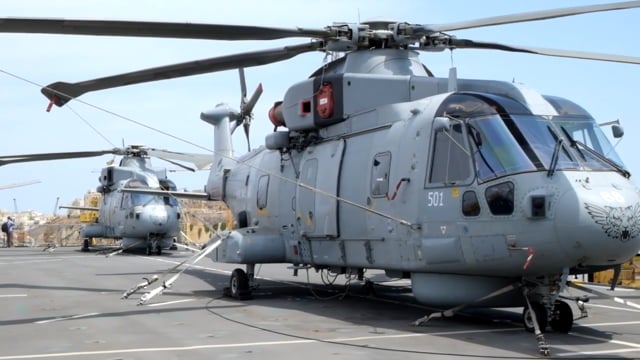[WATCH] Numbers of migrants in need of rescue have surprised everyone - Royal Navy Commodore
British life-saving and warship HMS Bulwark arrives in Malta for the weekend





Commodore Martin Connell said that the numbers of migrants in need of rescue had surprised everyone.
“As a part of the navy, we are used to the duty of rescuing and offering aid to those in need, but the sheer numbers of those in need has been shocking,” he said explaining that despite his familiarity with the Mediterranean “seeing hundreds and thousands” had surprised him.
The HMS Bulwark, which docked in Malta earlier today for a well-deserved operational stand-down in the country for the weekend. The vessel has already saved some 3,000 people in its Mediterranean Search and Rescue mission which will last another 60 days.
Connell explained that the vessel had just been through one of its busiest weeks, after it rescued a total of 1,200 migrants in nine separate rescue missions. He added that some of the sailors on board had been at sea for the past year.
"Shortly after hosting a visit of the UK Secretary of State for Defence Michael Fallon and Maltese High Commissioner Norman Hamilton, HMS Bulwark co-ordinated the rescue of nearly 1,200 people from nine dangerously overcrowded and unseaworthy craft,” Connell added.
During a tour of the ship, journalists were even told a particularly heart-warming story that happened during Sunday’s rescue. One of the women rescued, was heavily pregnant, and she went into labour while the rescue operation was going on.
“The woman was taken to Malta on an emergency where she gave birth to a boy,” they said, adding that that some of the crew were very eager to visit the woman who was still in hospital during their short stay in Malta.
The vessel, carries some 225 marines for long periods and it also holds an average of 800 survivors rescued at sea.
Connell also explained that the vessel had dropped off those rescued in Catania and Taranto so far. He said that the ship was constantly carrying out radar investigations and working with different agencies and coastguards to understand exactly what was going on in the Mediterranean.
Captain Nick Cooke-Priest explained that the main issue was that people who were desperate to find a better future, were being sent in unworthy sea vessels with a complete disregard for their safety.
“We have a view that smugglers need to be removed as this is the root cause of the problem. The way to fight this would be to sort out the problem on land, and address the issues that are enabling smugglers to operate,” he said adding that although rescue operations would continue, the problem was likely to continue unless the situation on land was resolved.
Connell explained that once the vessel received a call for rescue, the vessel contacted the maritime rescuing coordination centres in Malta, and Italy. He added that part of the problem at the moment was that the Libyan centre was not coordinating properly.
“We then see which vessel is closest to any event and offer aid as quickly as we can,” Connell said adding that this often meant that merchant vessels offered first assistance.
“We do everything we can to offer immediate assistance to those in need. If the boats capsize and these people find themselves in the water, then their survival rate has been reduced by minutes,” he said.
Cooke Priest added that the crews had seen a number of diseases including scabies and malaria, but that those rescued predominantly suffered dehydration and even sea-sickness and exhaustion.
Cooke-Priest said that the operation was very much like an amphibious operation, given the HMS Bulwark’s unique versatility, given its capacity to contain landing craft and aircraft.
“So far I’ve deployed landing craft and aircraft in multiple waves, often in poor visibility, operating autonomously over the horizon with the objective of saving a life,” Cooke-Priest said.
The captain said that the ship had also been employed in the evacuation of Lebanon in 2006, and that given the varying nature of the missions, constant training was crucial to the crew.
The captain also explained that the ship was in Malta to conduct vital engineering work and take humanitarian stores on board while at the same time giving the sailors and Marines some downtime in a country with strong historic bonds with the Royal Navy.
“Given the success of our visit to Valletta in December last year, the Ship’s Company see this operational stand-down in Malta as a real highlight in our deployment,” he said, adding that the ship would soon be setting off on the next patrol cycle.






.jpg)
















